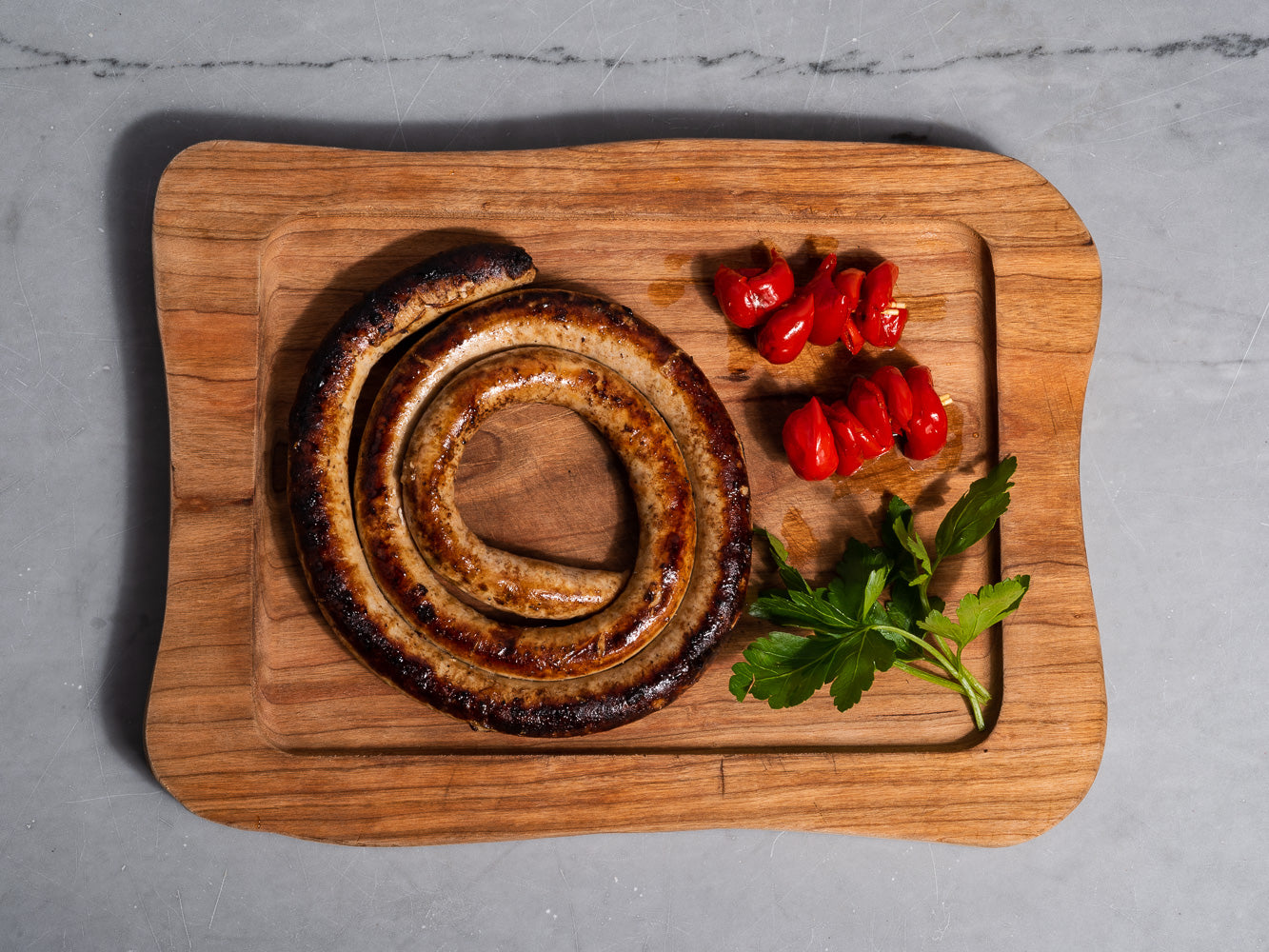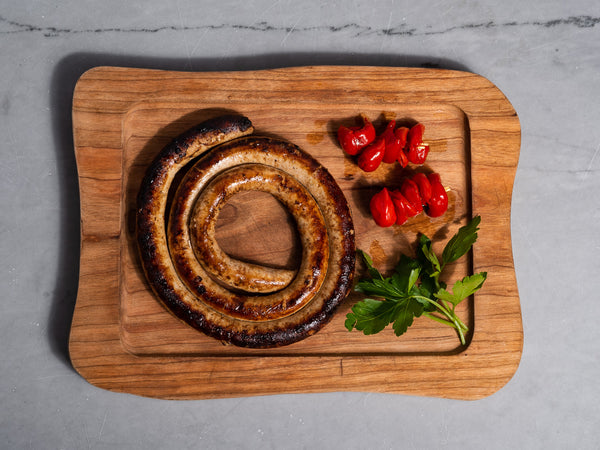

The only heritage turkey sausage on the market today — Three 1lb wheels
Turkey Sausage Wheels with Provolone and Cherry Peppers
Three 1lb wheels
Crafted by New York City's own Pepe Giocoli
Additional discounts cannot be applied to sale items. Sale items must ship immediately.
To celebrate 20 years, we are proud to introduce a Heritage Turkey first! We are sure you will love our Good Shepherd Ranch heritage turkey sausage produced by one of the premiere artisans in the U.S.
These Sweet Italian sausages with provolone cheese and cherry peppers are true classics, embodying the genuine regional flavors of New York City. Lightly seasoned, they have an outstanding flavor and an incredibly snappy texture.
Frank Reese turkeys provide the perfect ingredient for these Italian style recipes that are sure to become an annual tradition in our holiday catalog and at your table!
These rare and endangered turkeys have been bred by Frank Reese on the Good Shepherd Ranch in Kansas, the only remaining commercial USDA certified Standardbred heritage poultry farm in the U.S. Good Shepherd turkeys comprise the oldest continuous breeding lines of turkeys in North America and all are raised to these standards: Certified Standardbred, Pasture Raised, Free Ranging Flock, Vegetarian Fed, and Naturally Mating.
Pepe Giocoli produces New York/Italian classic sausages using 100% heritage breed pasture raised meat. The thin wheel gives each sausage a perfect snap. Pasture raised heritage breeds produce marbled delicious meat, so every bite is sure to be sweet and juicy.
Parma Sausage Co. has been producing the very best New York style sausages from an original family recipe since the 1950's. This is truly the apex of the Italian-American art of sausage making. This is third generation greatness from a no-nonsense artisan who wears his white butcher’s smock like a coat of armor. New York has its own regional cuisine, and these Italian sausages are true classics.
Ingredients: Turkey, water, salt, provolone cheese (pasteurized milk, culture, rennet, salt), cherry peppers, dextrose, flavorings. In sheep casing.
Good Shepherd Poultry Ranch is one of the most important farms in the world. Every morning at sunrise, for more than 50 years — in rain, snow, deep cold and heat — Frank Reese opens the massive doors of the huge barns that house his few thousand birds, starting a trickle, then a wave, of chickens and turkeys who will free range the hundred-acre property for the day, before they are shepherded back indoors at night. These birds are truly free range and spend their time walking, picking the fields for food, naturally reproducing, and flying onto trees and fence tops. And they are truly from old stock — on this farm in Kansas live some of the last chickens and turkeys from a time before factory farming took over our food system. They are all endangered breeds.
Right before our eyes, dozens of our foundational poultry breeds are on the brink of extinction. These strains’ importance to America’s culture, food safety, and biodiversity is incalculable. Their loss would spell disaster for the future of the sustainable food system.
While most remain unaware of the looming extinction of Standardbred poultry breeds in the United States, there is a small community working to combat this crisis. One man on the plains of the Kansas prairie stands out as their greatest champion. Frank, in his seventies, is the sole remaining commercial breeder of Certified Standardbred poultry in the United States.
His Good Shepherd Poultry Ranch stands as the last remaining stronghold for many of America’s most important market breeds of chickens and turkeys with lineages dating back to the 19th and early 20th century including Plymouth Rock, New Hampshire, Rhode Island White, Cornish, Leghorn, Minorca, Bronze, Narragansett, White Holland and Bourbon Red.
Having only one commercial farm left in the country to protect these natural treasures leaves them extremely vulnerable. In order to provide a safe future for these breeds, we must drastically increase their numbers. To address this issue, Frank Reese has started a nationwide conservation effort which will increase 10 breeds’ numbers to 100,000+ birds and spread them out over hundreds of farms throughout the United States. Heritage Foods, together with the Good Shepherd Conservancy, a 501(c)(3) non-profit, are building a center to train farmers, to grow a larger hatchery to produce more birds, and to bring visitors from around the world to learn about this important issue.
The agri-tourism site being built on the farm will allow consumers, chefs, and farmers to visit for themselves the world site that is Good Shepherd Ranch. There is a collage of multicolored feathers on Franks farms, from birds that each boast a unique history, taste, and flavor. The Bronze turkey for example shimmers with its coppery, bronze-colored metallic sheen and has origins in Rhode Island —it is the foundation for all domestic turkeys in the United States and the closest connection we have to the origin of the domesticated turkey.
The Barred Rock chicken, with its beautiful white and black barred feather pattern, is the foundation of the chicken industry and was raised by the millions from 1870 -1950. They remained king of the industry until they were replaced by the industrial Cornish. They say the original Barred Rock has never been beat in a tasting contest. As an animal it is hearty, tough and reliable as well as lovely to look at.
It’s remarkable to think that almost every bird in the United States comes from the same genetic stock, derived from the same two or three industrial hatcheries producing unhealthy birds that cannot fly or survive in nature, and that have been built to die after only two or three years. The baby poults being supplied to farms large and small are a far cry from their healthy ancestors. They have not been genetically modified, like seed companies do, but they have been so overbred for certain traits like large breast size, fast growth, and small legs that they must be fed antibiotics and kept indoors to survive. The technology does not exist to freeze poultry sperm, so rare breeds must continue to reproduce their flocks on the farm, generation to generation, making Frank’s place in the world all the more important.
When Heritage Foods first started we sold only heritage turkeys from Good Shepherd Poultry Ranch. We learned about them through the Slow Food Ark of Taste Project designed to save foods on the brink of extinction. The story of Frank was so compelling to us — his birds came to him from his mentor Norman Kardosh who inherited the birds from his Mother who had received heritage eggs by train from the Bird Brothers Hatchery in the 1860s. The birds Frank raises are essentially descended from stock that have only ever lived on the same two farms for more than 100 years! When we came to understand all these details, and that Frank was the last of his kind, just like so many of the birds on his farm — we had to do something!
Through sales direct to homes and to restaurant chefs, markets, and butchers we have managed to lay a stake in the ground claiming that we will not lose these birds to history and that fast food will not overtake our entire food supply! Thank you to all the buyers who have made this conservation effort a success story, all the while enjoying by far the tastiest birds on the market today!
Standard Bronze
The Bronze is the patriarch of all American turkey varieties in existence today. Carrying the genes of every other breed on our list, this bird holds the key to preserving the American Standardbred turkey. A great forager with a strong immune system and tolerant of extreme cold, quality and resilience have helped the Standard Bronze stand the test of time.
Narragansett
This breed of turkey is likely the second oldest on our list. A natural mutation from the Bronze, it was developed by turkey farmers in the Narragansett region of Rhode Island in the 1800s. Beautiful silver and buff feathering, cold tolerance, and delicious flavor all make this historic bird very worthy of protection.
White Holland
The history of this noble breed stretches hundreds of years back, when it naturally mutated from the Bronze, much as the Narragansett did. Historically disfavored due to its white feathering, this attribute now makes it essential in the modern marketplace which favors white feathered birds. A healthy and robust bird with great potential and a storied past, we must conserve the White Holland to meet the needs of today’s picky consumers.
Bourbon Red
This is the newest breed of turkey that we are seeking sponsorship for. Developed in the early 1900s, this chestnut-red bird’s slow growth and slightly smaller stature make it more heat tolerant than the other turkeys on our list. Notably, the Bourbon Red was chosen by Marian Burros of the New York Times as the tastiest turkey in America, sparking a resurgence of interest in Standardbred turkeys throughout the United States.
Grilling: Remove sausage from its packaging and pat it dry. Fire up your grill and lower to medium heat. Use a knife to score the sausages so they do not burst on the grill. Place the sausages on the grill and cook for 8-10 minutes, turning occasionally to ensure even cooking.
Oven Roasting: Preheat the oven to 375ºF. Remove sausage from its packaging and pat it dry. Place it on a rack in a roasting pan and place the pan in the oven.Roast for 15-20 minutes and flip sausages halfway through cooking to ensure even browning on both sides.
© 2026, Heritage Foods Powered by Shopify
